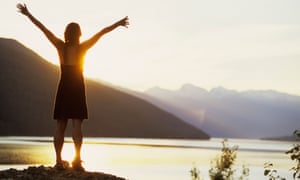This, I think, is an interesting compilation on some popular topics of nature.
I'm deeply researching landscape, experience and pilgrimage. So, yes, also interested in relationships of human - nature, let's skip the dichotomy;-)
Perhaps it's the postmodern motive to long for the rural/nature to escape from the urban.
Perhaps humans have attachments to specific landscapes, like the savanna as ancestral environment of early Homo in the savanna theory. Which perhaps leads to problems with our modern environment?
Well, I compiled some nature snippits.
Have a look at what nature does for the brain,
find out of nature is right for you,
know about this nature practice: shinrin-yoku?,
enjoy the nature therapy,
plus a bonus and some additional links to other readings and research.
And by all means, try the nature therapy,
it's not the real thing, but does it work in any way for you?
Startoff with an article from the Guardian.
"Travel broadens the mind, but can it alter the brain?
Studies suggest that taking a gap year or studying abroad can positively influence your brain to make you more outgoing and open to new ideas.

I'm nature
WWF
(1:21)
Is nature right gor you?
Nature RX
(1:32)
Shinrin-yoku or Forest bathing
(1:11)
If you're not in the position to enter the forest at the moment, I'll provide a substitute.
Nature therapy
Semi:Free Creative
(30:41)
TED Presentation by
Emma Marris: Nature is everywhere -- we just need to learn to see it
Notice the definition of nature!
(15:52)
And when we are walking and attending nature, perhaps we'll get hugged for embracing the idea to preserve and honour what's left.
(China and the US finally embraced the Paris climate treaty in sep 2016 ;-)
Polar bear Nissan Leaf
NissanMalaysia
(1:02)
Furthermore:
Eyes4Earth.org covers insides on meaningful nature experiences and is based on the phd study of Matthew Zylstra.
Additional reading:
American Scientist,
A Walk in the woods (click)
(not scientific but references in comments)
Elizabeth Freeman, Jacqueline Akhurst, Katrina Bannigan and Hazel James
Health Promotion International, June 2016
"Benefits of the WSE (Walking and solo experience) that contributed to a general sense of well-being were:
(i) gaining a sense of freedom and escape;
(ii) gaining a sense of awareness and sensitivity to one's environment and its influence
(iii) gaining confidence in being able to cope and take action;
(iv) gaining a sense of perspective on and appreciation for life."
Gregory N. Bratmana, Gretchen C. Daily, Benjamin J. Levyc, James J. Gross
Landscape and Urban planning, 138, 2015
"• Nature experience produced clear benefits for affect (e.g., decrease in anxiety and rumination).
• Nature experience produced some benefits for cognition (complex working memory span task).
• Supports the idea that exposure to natural greenspace can improve affect and cognition."